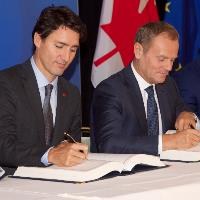(BRUSSELS) – Early signs from the trade agreement between the EU and Canada, which entered into force a year ago, are that it is starting to deliver for EU businesses, large and small, with exports up in many sectors.
Friday 21 September marks the first anniversary of the provisional entry into force of the Comprehensive Economic and Trade Agreement (CETA) between the EU and Canada. The EU’s Trade Commissioner Cecilia Malmstroem is to visit Canada on 26 and 27 September to take stock of progress.
“The preliminary data shows there is plenty to celebrate, even at this stage. Exports are up overall and many sectors have seen impressive increases. This is great news for European businesses, big and small,” said Ms Malmstroem. “As ever with these agreements, there are certain areas where we have to make sure that we thoroughly implement what has been agreed, making sure that citizens and companies can fully benefit from the new opportunities.”
In addition to removing virtually all customs duties, CETA has given a boost to the business climate between the EU and Canada, reports the EU executive, ‘offering valuable legal certainty for EU companies looking to export’.
Across the EU, the latest statistics available, covering the October 2017 to June 2018 period, suggest that exports are up by over 7% year on year.
Of these, certain sectors are doing especially well. Machinery and mechanical appliances, which make up one fifth of EU exports to Canada, are up by over 8%. Pharmaceuticals, which account for 10% of the EU exports to Canada and are up by 10%. Other important EU exports are also on the rise: furniture by 10%, perfumes/cosmetics by 11%, footwear by 8% and clothing by 11%.
In terms of agricultural products, there are also some encouraging figures: exports of fruit and nuts increased by 29%, chocolate by 34%, sparkling wine by 11% and whisky by 5%.
The CETA agreement eliminated tariffs on 98% of products that the EU trades with Canada. This amounts to approximately 590 million in saved duties per year once all the tariff reductions kick in.
The Commission says it also gives EU companies the best access ever offered to companies from outside Canada to bid on the country’s public procurement contracts – not just at the federal level but at provincial and municipal levels, too.
The EU has 39 trade agreements with 69 countries in place. The latest agreement concluded by the EU is with Japan.



